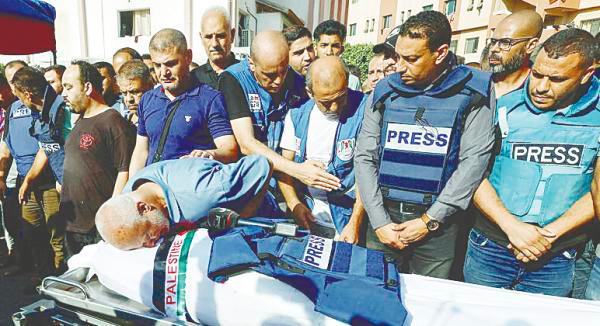JOURNALISTS are the pillars of information, providing the public with accurate, timely and relevant news.
We must always remember the significance of journalistic integrity, the impact of language and the persistent challenges faced by the media worldwide, including misinformation, press freedom and the dangers journalists encounter in conflict zones.
Language is the bedrock of journalism, and its power cannot be understated.
In our multicultural and multilingual country, journalists must navigate and utilise the rich tapestry of languages to convey news accurately and inclusively.
As a civil servant, I see firsthand how crucial it is for journalists to master language, enabling them to report with clarity, nuance and sensitivity.
This ensures that diverse voices and perspectives are represented, fostering understanding and unity within our society.
One of the most pressing challenges in today’s media landscape is the proliferation of misinformation. Fake news and misleading information can spread rapidly, causing confusion and eroding public trust.
Journalists play a crucial role in combatting misinformation by adhering to rigorous standards of verification and fact-checking. By using precise, clear and accurate language, journalists can dispel rumours and provide context that helps the public understand complex issues.
Additionally, multilingual reporting can bridge information gaps, ensuring non-dominant language speakers can access reliable information.
It is important to acknowledge the efforts of journalists who strive to maintain the integrity of information and to emphasise the importance of media literacy among the public to discern credible sources from dubious ones.
Freedom of the press is the cornerstone of a democratic society, allowing journalists to report without fear of censorship or retribution.
In Malaysia, strides have been made to uphold this freedom, with the government playing a crucial role in fostering an environment that supports media independence.
However, challenges remain, and the government and society must work together to ensure journalists can operate freely and safely.
Maintaining transparency and accountability is vital. We must continuously reaffirm our commitment to protecting press freedom. This includes supporting government initiatives and policies that safeguard journalists and creating an environment where they can work without intimidation or harm.
As we appreciate the contributions of journalists, we must also remember those who have paid the ultimate price in the line of duty.
The conflict in the Middle East has seen numerous journalists lose their lives while trying to bring the truth to light. These journalists exemplify courage and dedication, often working in unsafe conditions to report on critical issues.
Their sacrifice highlights the inherent risks of the profession and the importance of safeguarding those who undertake it.
The international community must recognise and condemn the targeting of journalists in conflict zones. Measures should be taken to ensure their protection, and hold those responsible for their harm accountable. We should honour the memory of these brave individuals and call for stronger protections for journalists worldwide.
Journalism is not just about reporting the news, it is about shaping the future. By informing the public, holding power to account and fostering informed discourse, journalists contribute to the development of a more just and equitable society.
The essential role of journalism in our democracy cannot be overstated. Journalists have significantly contributed to the government by promoting transparency and accountability, facilitating public communication, highlighting public concerns, supporting crisis management and encouraging civic participation.
Furthermore, journalists act as intermediaries between the government and the public. Through their reporting, they help disseminate government policies, programmes and initiatives, ensuring the public is well-informed and can engage with these policies effectively.
Journalists also bring to light the issues and concerns of the public, providing a platform for voices that may otherwise go unheard. This feedback is invaluable for the government to understand and address the needs and aspirations of the people.
During crises, such as natural disasters or health emergencies like the Covid-19 pandemic, journalists played a critical role in relaying important information swiftly and accurately. Their work helped to manage public expectations. They also provided essential updates that saved lives.
By covering electoral processes, political debates and civic issues, journalists encourage public participation in the democratic process. They help to educate voters and ensure that elections are conducted fairly and transparently.
Malaysia’s National Journalist Day, or Hawana, is celebrated on May 29 to honour the invaluable contributions of journalists to our society.
It is a day for reflection and commitment, recognising their achievements, acknowledging the challenges they have faced and honouring those who have made sacrifices.
It is also a time to reaffirm our dedication to the principles of free and fair journalism, the fight against misinformation and the protection of journalists everywhere.
The writer is a training consultant at the Communication and Language Studies Centre at the National Institute of Public Administration. Comments: letters@thesundaily.com









